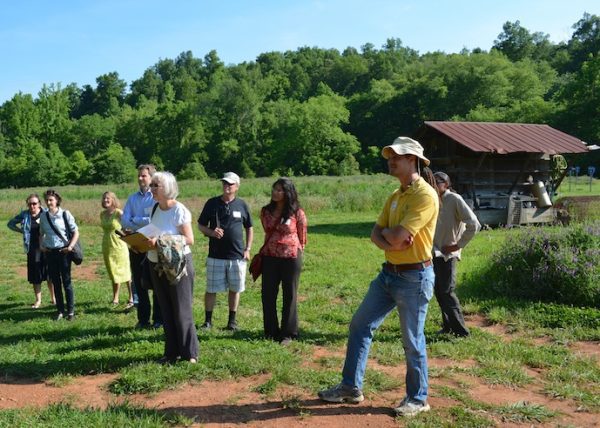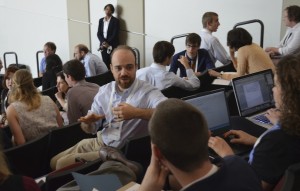Integrated Network for Social Sustainability Builds Tools, Connections

One way to think about sustainability is as a three-legged stool, with environmental, economic and social sustainability as the legs.
Social sustainability is the wobbliest of the three legs, because it is less defined and studied. A broad definition takes into account relationships, interactions and the institutions that affect and are affected by sustainable development. Beyond this general definition, people have a wide array of perspectives on what it is.
To help address this aspect of sustainability, faculty from varied fields at UNC Charlotte have organized the Integrated Network for Social Sustainability.
“Part of the social sustainability work has been to consider how do we get other people’s voices involved, so that it’s not just the scientists deciding what the future should look like,” said Nicole Peterson, an anthropology assistant professor who is a network leader. “That’s one of the reasons we have the network as open as possible. Anyone can join. It’s meant to be a place for people to read about, think about and contribute to the conversation of what is social sustainability.”
As a National Science Foundation-funded Research Coordination Network, INSS also has received support from throughout UNC Charlotte and other entities.
 Leaders from UNC Charlotte include Brett Tempest and Helene Hilger of Engineering; Liz Miller and Jen Munroe of English; and Thomas Gentry of Architecture.
Leaders from UNC Charlotte include Brett Tempest and Helene Hilger of Engineering; Liz Miller and Jen Munroe of English; and Thomas Gentry of Architecture.
The steering committee includes academics from other institutions, along with community, business and government leaders. Henry Doss, the college’s Executive in Residence, is part of the steering committee.
Over 300 people have joined the network as members. They, too are diverse, coming from higher education, government, businesses, advocacy organizations, community groups and other walks of life.
The network has hosted two conferences and additional meetings. Approximately 75 people have attended each of the two conferences, some in-person and others virtually.
The conferences have featured tours of Stonewall Jackson Youth Development Center, Elma C. Lomax Incubator Farm, Friendship Trays and a sustainable manufacturing site. The presentations during the conference prompted ideas to organize the work and resources that were needed.
“What came out of that were projects,” Peterson said. “One of the ones that’s really taken off is an assessment tools group that is looking at what tools have been used to assess social sustainability.” After constructing an inventory, the group will consider how well each tool has assessed social sustainability and build a clearinghouse of tools.
“Another group that’s picked up speed in the past year is the research priorities group,” Peterson said. “What don’t we know? What kind of research do we need to do to really help us define social sustainability, to communicate it, to look at different aspects of it?”
The public communication project group is organizing a video competition, and the space/definition working group is beginning a series of discussions about articles characterizing social sustainability.
Many of the project groups have identified the need for case studies. The inventory of case studies presented at the conferences and shared online is growing.
“At this point, how we see the network is largely as a set of resources that these project groups or others can use to coordinate, network and create potential projects together,” Peterson said. “We’re really trying to provide a set of tools that people can use to coordinate across these geographical spaces with people who have similar interests.”
UNC Charlotte’s Miller is analyzing recorded speech from the conference, from a linguistics perspective. This can help those involved discover if they are talking “to” each other or “past” each other.
Network leaders also met in the spring with 10 sustainability officers from Charlotte area businesses, government agencies and universities to discuss social sustainability in business and related industries. They sought context on how these people think about social sustainability and barriers they face. This group identified assessment tools as important for their work, to make social sustainability tangible and connect it to their business goals and efforts. The group also spoke about ways to showcase efforts that go unrecognized.
The network invites others to join in the work. To learn more or to join the network.